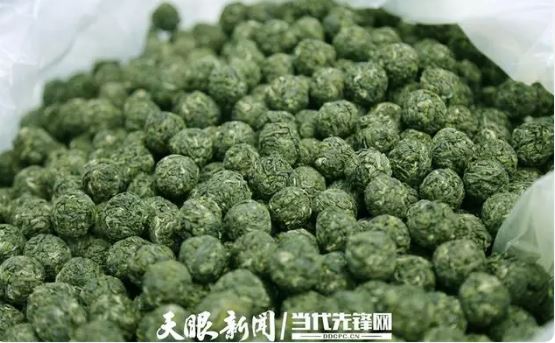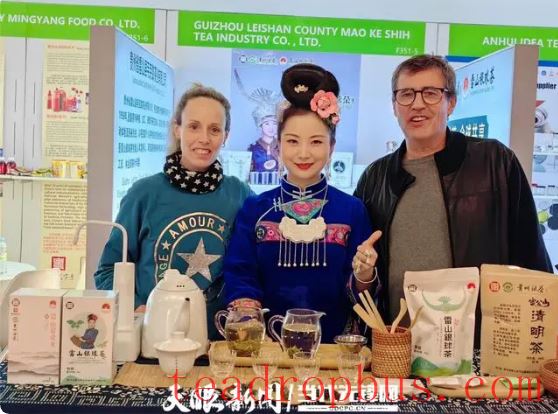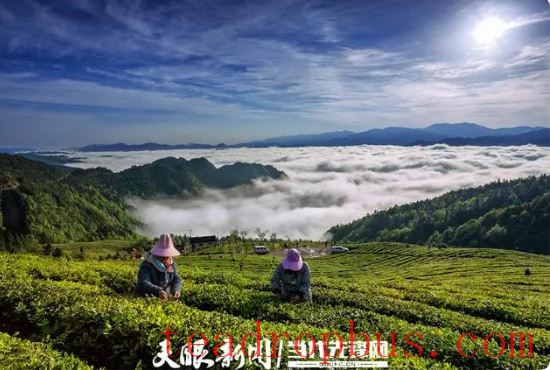Gui Mountain's “Tea Observation” Series Report ③: Leishan Chapter
Implementing a comprehensive revitalization of the countryside, industrial revitalization is fundamental. President Xi Jinping emphasized that industrial revitalization should be given top priority in rural revitalization.
Gui and Qian waters are endowed with beautiful natural scenery and rich resources. On the hills and mountains, over 7 million mu (about 466,667 hectares) of Tea gardens have become a “green ATM” for the people. Tea, the “ancient divine tree” of the East and the “green treasure” of Guizhou, thrives in Guizhou, which has excellent ecological conditions for tea cultivation, being the only province in China characterized by high altitude, low latitude, abundant mist, and no pollution across its entire highland tea region.
Guizhou has a long history of tea cultivation. After years of relentless efforts, it has become one of the major tea-producing provinces in China. It continues to optimize marketing and distribution environments, making great strides in Tea culture, tea industry, and tea science. The province has achieved commendable results in the integration of tea industries, leading to prosperity for its people and a beautiful environment, harmoniously combining green mountains and clear waters with gold and Silver mountains, laying a solid foundation for the comprehensive revitalization of the countryside.
“Short in stature, with white blossoms, greening thousands of hills, enriching countless families.” As the spring breeze dresses the land in green and the scent of tea fills the air, let us venture into the heart of Gui Mountain to observe tea, tracing the path of tea's prosperity and the people's wealth, sharing the joy from every link in the tea industry chain.
【Please share “Gui Mountain's ‘Tea Observation' Series Report ③: Leishan Chapter” in this issue】

Close-up of Leishan Silver Ball Tea. Provided by the Publicity Department of the Leishan County Committee of the CPC
“Silver Ball Tea, very delicious!” The slightly awkward Chinese spoken by Spanish friends brings smiles to our faces.
On March 18, at the Barcelona International Food and Beverage Exhibition in Spain, Mao Juan, dressed in magnificent Miao silver ornaments and hailing from Leishan County, Qiandongnan Prefecture, Guizhou Province, placed a Leishan Silver Ball Tea into a cup. As boiling water was poured in, the leaves unfolded like flowers in the water, the aroma wafted through the air, and the taste was refreshing and pleasing, earning praise from those who tasted it.

Mao Juan, the chairman of Leishan County's Mao Kexi Tea Industry Co., Ltd., an 80s-born third-generation tea inheritor, posing for a photo with foreign friends in Barcelona, Spain. Provided by the Publicity Department of the Leishan County Committee of the CPC
The Leishan Silver Ball Tea, produced in the Leigongshan National Nature Reserve in Guizhou, stands out with its unique silver-gray spherical appearance and traditional production techniques, distinguishing itself among Guizhou's self-branded teas. Since its introduction in 1982, it has won more than 40 awards and was included in the list of national geographical indication protected products in 2014, becoming the star product of Leishan's tea industry.
Small tea balls make a big market impact.
When discussing Leishan Silver Ball Tea, the name Mao Kexi comes up frequently in the Leishan tea community.
“Leishan Silver Ball Tea was created by my grandfather Mao Kexi along with dozens of workers after many years of hard work and research. Unlike loose tea, Compressed tea, or brick tea available on the market, it is shaped like a silver bell worn by Miao women, and it was named so because of China's success in international table tennis at the time,” recalls Mao Juan, the chairman of Leishan County's Mao Kexi Tea Industry Co., Ltd., an 80s-born third-generation tea inheritor, as she recounts her grandfather's pioneering efforts in developing the Silver Ball Tea.
Leigong Mountain, located within Leishan County and reaching an altitude of 2,178.8 meters, is the main peak of the Miaoling mountain range. Leigong Mountain is often shrouded in mist, and the altitude of 1,200 to 1,400 meters is ideal for tea cultivation, with a long history of tea planting. In the early 1980s, Mao Kexi, a government official with a deep interest in tea culture, volunteered to set up camp in Juesan Village, Danjiang Town, and dedicated himself to expanding the tea industry in Leishan.

Leishan Silver Ball Tea is born in the Leigongshan area, known for producing fine tea in the high mountains and misty clouds. Provided by the Publicity Department of the Leishan County Committee of the CPC
Leveraging traditional tea-making techniques and the high pectin content in the new shoots of Leigongshan's Spring Tea, Mao Kexi repeatedly experimented with rolling the tea buds into balls, creating Leishan Silver Ball Tea with a bright and refreshing flavor, which received high praise from domestic tea experts. Since the 1980s, Leishan Silver Ball Tea has won numerous awards, marking the beginning of its journey to become a leading brand in the industry. Mao Kexi also became a tea expert enjoying special allowances from the State Council and founded the Mao Kexi Tea Industry Co., Ltd. of Leishan County.
Following the path laid down by his predecessors, the next generation continued to flourish. In Mao Juan's memory, her father Mao Hua spent several months each year promoting Leishan Silver Ball Tea at various trade fairs, leaving her without a fatherly presence for extended periods. She took over the family business to carry forward the legacy of her grandfather and father, “In 2025, I had been working at the county tourism bureau for several years. When my mother fell ill, my father struggled to balance both his career and family. So, I gave up my stable job and took over the tea business. In 2025, I applied and became the third-generation inheritor of Silver Ball Tea, and developed e-commerce live streaming to expand our sales channels.”
Time passes swiftly. A small silver ball, approximately 18 to 20 millimeters in diameter, has grown into a significant industry that enriches the people. Three generations of the family's dedication to tea over 40 years reflects the spirit and innovation of tea professionals in Guizhou.
Departing from Xijiang Thousand-House Miao Village, we drive along winding roads for over an hour to reach the core area of the Leishan Silver Ball Tea base in Jiaoyao Village, Xijiang Town. At the end of March, it is still chilly at altitudes above 1,400 meters in Jiaoyao Village. “Mist blankets the ground like a quilt, and autumn winds sweep through the village, causing panic. Bracken serves as the main food, and ashes as salt, and no girl would marry a man from Jiaoyao.” This folksong from years ago describes the harsh living conditions in Jiaoyao. Today, the village is filled with the fragrance of tea and prosperous industries.
Early in the morning, Yang Shengming, the leader of the returning entrepreneurs and head of the Jiaoyao Yiwei Sanbei Tea Professional Cooperative, welcomed our visit. This capable person in Miao country left his executive position at a company in Guangzhou City six years ago to start his own business, focusing primarily on Leishan Silver Ball Tea.
“Our ancestors and parents relied on tea cultivation to ensure they had enough to eat. We must strive to turn the tea industry into a ‘cash cow.'” Yang Shengming is confident. Adjacent to the 4A-rated scenic area of Xijiang Thousand-House Miao Village, he plans to develop Miao tea culture exhibitions and other experiential projects to create a memorable experience for visitors.